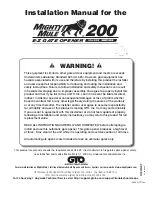
IMPORTANT SAFETY INSTRUCTIONS
2
M i g h t y M u l e 2 0 0
For The Consumer
WARNING: To reduce the risk of injury or death:
1.
READ AND FOLLOW ALL INSTRUCTIONS.
Failure to meet the requirements set forth in the instruction
manual could cause severe injury and/or death, for which the manufacturer cannot be held responsible.
2.
When designing a system that will be entered from a highway or main thoroughfare, make sure the
system is placed far enough from the road to prevent traffic congestion.
3.
The gate must be installed in a location that provides adequate clearance between it and adjacent
structures when opening and closing to reduce the risk of entrapment. Swinging gates
must not
open
into public access areas.
4.
The gate and gate opener installation
must comply with any applicable local codes.
I. Before Installation
1. Verify this opener is proper for the type and size of gate, its frequency of use and the proper class rating.
2.
Make sure the gate has been properly installed and swings freely in both directions. Repair or replace
all worn or damaged gate hardware prior to installation. A freely moving gate will require less force to
operate and will enhance the performance of the opener and safety devices used with the system.
3.
Review the operation of the system to become familiar with its safety features. Understand how to
disconnect the opener for manual gate operation
(see page 1).
4.
This gate opener is intended for
vehicular gates ONLY.
A separate entrance or gate must be installed
for pedestrian use (see page 6).
5.
Always keep people and objects away from the gate and its area of travel.
NO ONE SHOULD CROSS
THE PATH OF A MOVING GATE.
6.
Pay close attention to the diagram below and be aware of these areas at all times.
Gate in the
Open Position
ZONE 2
ZONE 3
ZONE 4
ZONE 5
Driveway
ZONE 1
Entrapment Zones
for a Pull-To-Open
Application







































